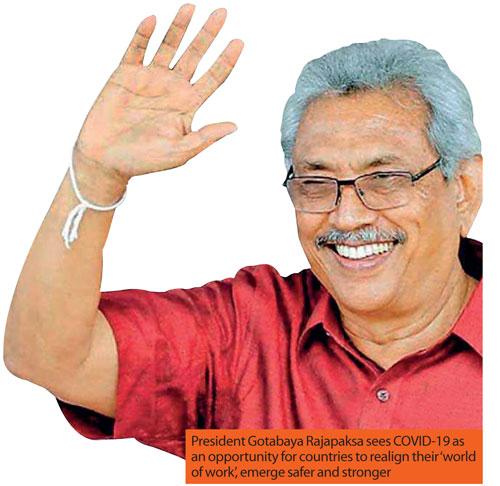Reply To:
Name - Reply Comment
Last Updated : 2024-04-20 00:00:00
 President Gotabaya Rajapaksa addressing the International Labour Organisation (ILO) Global Summit on ‘COVID-19 and the World of Work – Building a Better Future of Work’, said the skills sector in Sri Lanka requires a rethinking and re-engineering to accommodate the new normal, post COVID-19, while assuring to empower those who lost employment during this pandemic.
President Gotabaya Rajapaksa addressing the International Labour Organisation (ILO) Global Summit on ‘COVID-19 and the World of Work – Building a Better Future of Work’, said the skills sector in Sri Lanka requires a rethinking and re-engineering to accommodate the new normal, post COVID-19, while assuring to empower those who lost employment during this pandemic.
Today, many of our key sectors in the economy are critically starved of blue collar workers. This is a result of the poor orientation that is taking place at school level. As a result, young people are getting pushed into industries that are far less productive.
For example, the Sri Lankan universities, due to the limited intake capacity, by default only open their doors to the top 5 percent that sit for the Advanced Level exams. The majority joins the workforce with limited training or no training.

Only around 10 percent pursue their high-education in foreign universities or their satellite branches in Sri Lanka or enrol into a professional qualification or a diploma course in accounting, finance, management, HR and marketing.
Therefore, as a country, we need a new strategy to successfully move our young people from education to employment and we need to scale up our interventions for maximum impact because there are many different views among the stakeholders on how our young people should be made ready to succeed at entry level positions. As a result of this mismatch, the education to employment highway is now full of potholes.
Therefore, the reforms must find a way to motivate our youth to move to productive industries and from becoming mere certificate collectors and refocus them to acquire skills and competencies that are needed to deliver on the job. At the same time, it is important for professionals to focus on their continuous professional development because the life span of skills is now very short.
On the other hand, the private sector must also do more to support the growth and development of young employees, to help them to be as productive and successful as possible in their current and future roles.
There is ample research to show that the return on the training investment is higher in industries that engage well-educated workers and also in environments where there is rapid technological change.
Singapore’s use of training to promote the information technology sector through a concerted programme that involved educational institutions, providing training subsidies to schools and office workers and digitising of the civil service, helped the country to achieve leadership in technology-related services.
This success illustrates the importance of a government’s ability to foresee a major opportunity and then promote public-private partnership to invest in human capital formation. However, to make it a success, businesses must also stand ready to take advantages of the support the government is willing to provide to promote human capital formation.
In addition, the state must ensure that it maintains the per student share, in real terms, of government funding education.
Export drive
In successful export economies, the training provided by VTIs jointly with the private sector to upgrade the skills of their workforce has been crucial, since high-level skills are essential for manufacturing-related activities. Therefore, vocational training is widely recognised as very important, such training is rarely cost-efficient when provided by the state systems.
If the skills drive can be tied together with export policies, it will help to share the benefits more widely, for example by planning the measures that help workers get the skills needed to complete for new formal sector jobs.
Boosting exports in labour-intensive industries, which is a comparative advantage for South Asia, could also significantly lower informal sector employment, particularly for rural and less educated people.
Also steps to extend labour market gains more widely by investing in infrastructure, removing trade barriers and increasing the ability of workers to move to areas and into occupations where new jobs are being created, will be useful.
Today, intra-regional trade accounts for just over 5 percent of South Asia’s total, compared with 50 percent in East Asia. Greater Asian integration as pointed out by the International Chamber of Commerce provides an opportunity to help address the South Asian proposition of growth with persistent labour market shortfalls and a stagnant and reluctance for more trade.
Post-COVID economy
Today, the country’s university education is only limited to the brightest students in the country. The universities need to work very closely with industry to improve syllabi and the facilities to ensure that the country’s brightest students are instilled with the skills and knowledge the country needs, so that they can make a meaningful contribution to the country.
In addition, we also need to make education more affordable because cost still remains the number one barrier among the youth for not continuing their education. Therefore, we need to devise numerous ways to provide additional funds for economically vulnerable people through scholarships and subsidies.
As countries slowly open up their education systems, there is now a compelling need to restructure the education systems to ensure all girls and boys who are supposed to be in secondary education, even the ones who were out of school before the COVID-19 pandemic, develop and get the skills they need to find productive work and actively engage in economic progress.
Doing so will ensure that Sri Lankan youth become successful today and tomorrow and that the education and higher education and vocational training systems are more prepared to deal with future economic shocks and pandemics.

Add comment
Comments will be edited (grammar, spelling and slang) and authorized at the discretion of Daily Mirror online. The website also has the right not to publish selected comments.
Reply To:
Name - Reply Comment
On March 26, a couple arriving from Thailand was arrested with 88 live animal
According to villagers from Naula-Moragolla out of 105 families 80 can afford
Is the situation in Sri Lanka so grim that locals harbour hope that they coul
A recent post on social media revealed that three purple-faced langurs near t